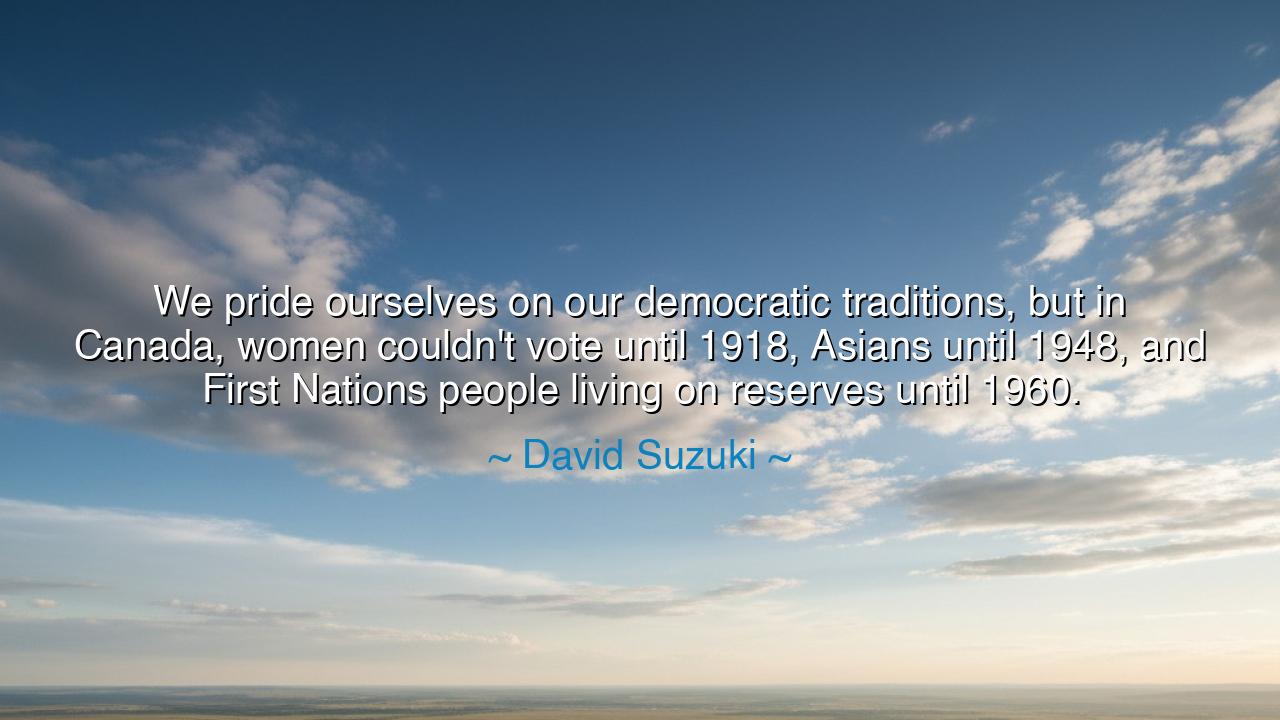
We pride ourselves on our democratic traditions, but in Canada
We pride ourselves on our democratic traditions, but in Canada, women couldn't vote until 1918, Asians until 1948, and First Nations people living on reserves until 1960.






Hear, O keepers of memory, the words of David Suzuki, who laid bare the contradictions of a nation: “We pride ourselves on our democratic traditions, but in Canada, women couldn’t vote until 1918, Asians until 1948, and First Nations people living on reserves until 1960.” These words are both a rebuke and a reminder—that beneath the shining cloak of democracy, shadows lingered, denying voice to those most in need of it.
For democracy proclaims equality, the right of every soul to shape the destiny of their land. Yet in Canada, as in many nations, this promise was not born whole but was painfully carved over time. Women struggled for the ballot, denied recognition until 1918, when their voices finally pierced the silence. Asians, marked as outsiders even within their own home, bore exclusion until 1948. And the First Nations, the ancient stewards of the land itself, were silenced upon their own soil until 1960. What is claimed as tradition is thus revealed as struggle, bought with tears and perseverance.
Consider the tale of Nellie McClung, one of the Famous Five, who fought for women’s rights in Canada. She and her sisters battled ridicule and opposition, yet their persistence brought about the Persons Case, declaring women to be "persons" under the law. Without their struggle, the word “democracy” in Canada would have remained an empty shell. Their courage is proof that every step toward justice is wrested from the grip of resistance.
So too must we remember that those of Asian descent, many of whom labored on the railways that bound Canada together, were denied the very rights of citizenship they had helped to build. And the First Nations, whose wisdom and lands formed the heart of the country, were forced to wait the longest, their voices shackled until 1960, as though democracy itself feared their truth. Their delayed inclusion is not just history—it is a wound still felt in the present.
Therefore, let this wisdom endure: do not boast of democratic traditions without also confessing their failings. For the greatness of a nation lies not in its proud declarations, but in its ability to confront its past, to learn, and to rise anew. Suzuki’s words are a call to humility and vigilance: to remember that democracy is not a gift completed in the past, but a struggle that must be tended, guarded, and expanded in every generation.






D809-Nguyen Thanh Dat 8/12
David Suzuki’s quote is a stark reminder that democracy didn’t come easily to everyone in Canada. The exclusion of women, Asians, and First Nations people from voting for so many years makes me question how much progress we’ve truly made. How much of our democratic history is overlooked or downplayed? Can we truly call ourselves a model of democracy when entire groups were systematically denied basic rights for so long?
T9Duy Thang 9a8_18_Tran
It’s hard to ignore the contradictions in Canada’s history when Suzuki points out the delays in granting voting rights to key groups. How can we pride ourselves on democracy when so many people were excluded for so long? Does this history of disenfranchisement impact how we view our current political system, and are there still barriers today that prevent full participation in democracy?
NNNang Nguyen
Suzuki’s quote really highlights the gap between Canada’s democratic ideals and its actual history. We often talk about our progressive values, but the reality is that significant groups of people were excluded from voting for decades. It makes me question how many other injustices are buried in our ‘democratic’ past. What other rights or freedoms did we deny others for so long, and what does this mean for the future of inclusivity?
QPquyen Phan
David Suzuki’s statement really challenges the idea that Canada’s democracy has been as inclusive as we often like to think. It’s shocking that women, Asians, and First Nations people faced such barriers to voting for so long. Why did it take so many years for these groups to have their voices heard in a country that prides itself on democracy? What does this say about the true history of democratic progress in Canada?